This article explores why the majority of AI initiatives fail to deliver value, urging organisations to recognise their maturity across three personas - Explorer, Scaler, and Innovator. It offers a structured, outcome-driven approach to overcome common GenAI adoption challenges and accelerate strategic impact.
- Explorers, who are just beginning their GenAI journey
- Scalers, who have launched pilots but struggle to scale and
- Innovators, who focus on maximszing impact and achieving long-term strategic differentiation.
A structured, outcome-driven approach to overcome these barriers and accelerate the impact of GenAI is vital.
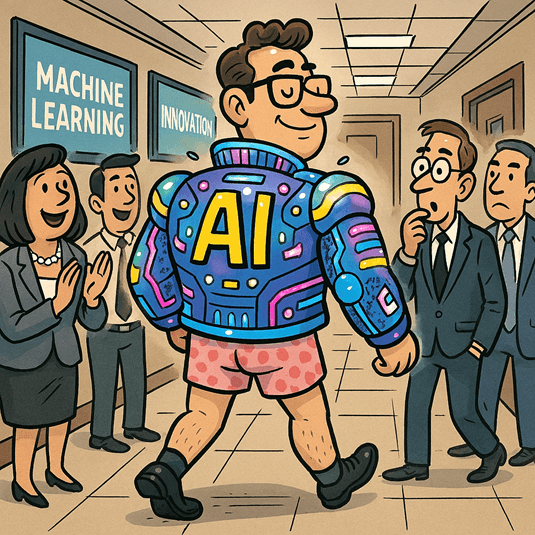
In the fictional kingdom of Technotopia, the CEO of a thriving enterprise heard whispers from neighbouring realms: “They’ve adopted AI. They’re innovating faster. They’re leaving us behind!”
Determined not to be outdone, the CEO declared, “We must have AI too! Something bold, transformative, and disruptive!” The team scrambled to assemble dashboards, algorithms, and neural nets with names like “Cognitive Synergy” and “Predictive Enlightenment.”
No one dared admit they didn’t quite understand what it all meant. After all, if the competitors were doing it, it had to be brilliant. The board nodded. The managers applauded. The teams went away to “get AI”.
Then came the grand unveiling. The CEO stood proudly before the company, adorned in the invisible robes of AI-powered insight. “Behold our future!” he proclaimed.
But after the applause died down, from the back of the room, a raised hand asked, “What does it actually do?”
Silence.
The dashboards blinked. The algorithms whirred. The CEO paused.
There’s a huge fear of being left behind…
Organisations are facing a sobering moment in their AI journey. After years of excitement and experimentation, many are hurtling towards a trough of despair:
- 88% of AI pilots fail to reach production, with most projects abandoned before delivering value
This fragmented approach is causing fatigue, frustration, and missed opportunities.
While GenAI offers transformative potential, we know and see first-hand how many companies struggle to adopt and scale it effectively. Progress is often hindered by fragmented strategies, infrastructure gaps, and organisational resistance, leading to long time-to-value, typically 3-5 years with traditional approaches.
Key challenges include:
- Lack of Strategic Clarity: No unified vision or roadmap.
- Talent Shortages: Limited expertise in GenAI architecture, responsible AI, and change management.
- Stalled Pilots: Prototypes remain stuck in PoC (proof of concept) due to unclear goals or lack of sponsorship.
- Weak Analytics: Poor diagnostics and performance metrics.
- Cultural Resistance: Low GenAI literacy and misaligned incentives slow adoption.
A structured, outcome-driven approach is essential to overcome these barriers and accelerate GenAI’s impact.
Our methodology categorises organisations into three distinctive phases of AI integration. So, whether you’re an
Explorer
Scaler
Innovator
Your challenges will require different forms of focus.
The Explorer’s Challenges
At the beginning of their AI journey, an Explorer’s primary focus is understanding GenAI’s potential and laying the foundation for success.
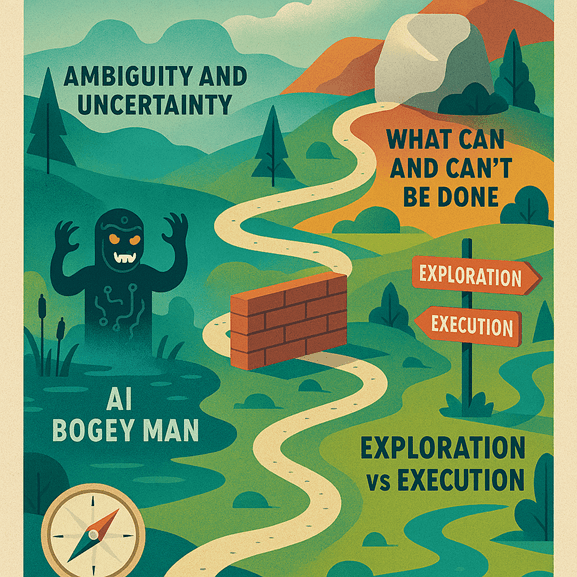
Explorers Face 8 Clear Challenges:
- Navigating Ambiguity and Hype
Difficulty separating substance from hype in a fast-evolving space. - Lack of Organizational Readiness
Foundational gaps in data, infrastructure, or talent stall progress. - Overwhelming Use Case Landscape
Too many options without clear prioritization leads to scattered efforts. - Cultural Resistance and Skepticism
Fear, ethical concerns, or lack of understanding hinder adoption. - Governance and Ethical Uncertainty
No clear precedent for responsible AI practices. - Difficulty Securing Executive Buy-In
Leadership demands immediate ROI or remains unconvinced. - Fragmented Insights and Siloed Knowledge
GenAI learnings are scattered across teams and platforms. - Balancing Exploration with Execution
Stuck in discovery mode without transitioning to delivery. - Tool Overload and Vendor Confusion
Saturated market makes it hard to choose the right tools. - Limited Internal AI Expertise
Lack of foundational skills leads to poor decisions or vendor dependence.
The Scaler’s Challenges
They’ve launched pilots or early deployments but are struggling to scale GenAI across the enterprise and realise consistent value.
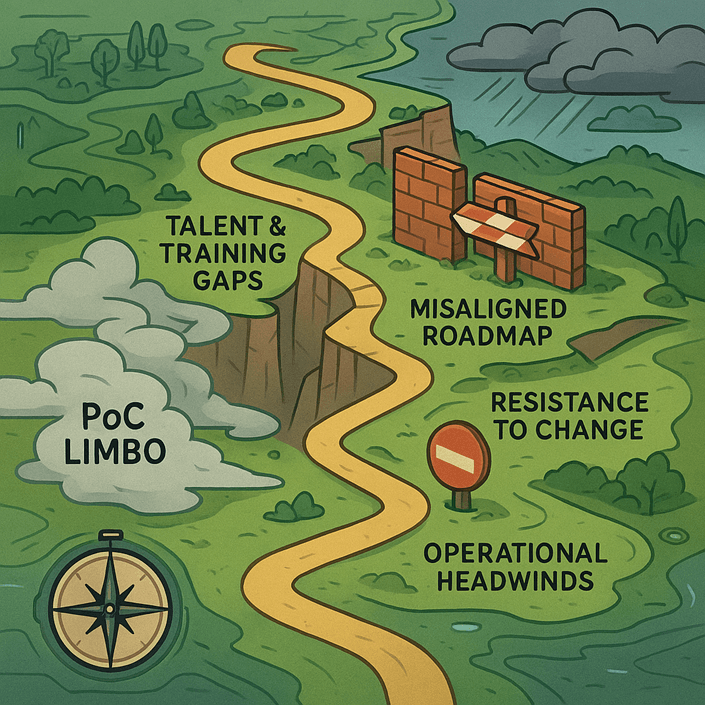
Scalers face 7 distinctive challenges:
- Stuck in “PoC Limbo”
Pilots don’t transition into production, stalling momentum. - Fragmented Capability Maturity
Inconsistent tooling and data pipelines across teams. - Talent and Training Gaps
Skills shortages create bottlenecks and vendor dependence. - Misaligned Roadmaps and Goals
Siloed initiatives dilute enterprise value. - Operational Headwinds
Legacy systems and compliance slow integration. - Organizational Resistance
Change fatigue and fear of automation hinder adoption. - Lack of Feedback Loops
No mechanisms to learn and iterate from deployments. - Model Performance and Reliability
Ensuring GenAI outputs are accurate and explainable. - Scaling Responsibly
Balancing innovation with ethical and legal risks. - Cost Management
Rising infrastructure and licensing costs challenge sustainability.
The Innovator’s Challenges
They’ve successfully adopted GenAI so their focus shifts to maximising impact and achieving long-term strategic differentiation.
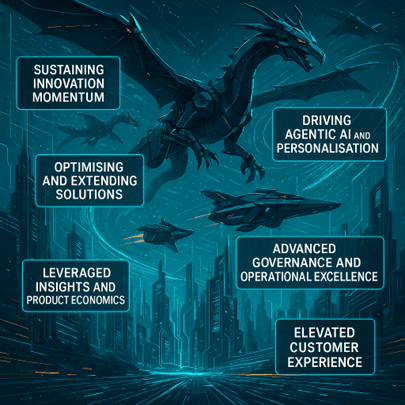
Even at a mature level of adoption, the Innovator faces 7 intense challenges:
- Sustaining Innovation Momentum
Harder to maintain bold experimentation after initial success. - Optimizing and Extending High-Impact Solutions
Scaling proven solutions without fragmentation or diminishing returns. - Driving Innovation in Agentic AI and Personalization
Advanced capabilities needed for autonomous and hyper-personalized systems. - Custom Model Development Risks
High R&D costs and uncertain ROI. - Advancing Governance and Operational Excellence
Governance must evolve with scale and complexity. - Bias, Fairness, and Inclusion
Ensuring equitable outcomes across diverse user groups. - Security and Adversarial Risks
Protecting models from misuse and vulnerabilities. - Leveraging Insights and Product Economics
Turning usage data into strategic decisions. - Scaling GenAI Brand and Talent Strategy
Building a GenAI-savvy workforce and market identity. - Elevating Customer Experience Leadership
Using GenAI to deliver seamless, intelligent, and differentiated CX.
Your Go-To Snapshot:
No matter where you are in your journey, whether you’re an Explorer, Scaler or Innovator, our expert and experienced teams know the answers to accelerating innovation along your AI journey. Chat to us today for intelligent and practical solutions across banking, insurance, mining, energy, retail, public enterprises and more.
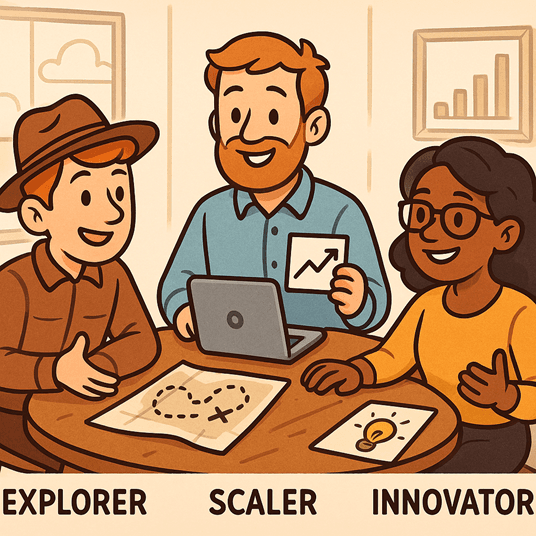
All images created with the help of GenAI






